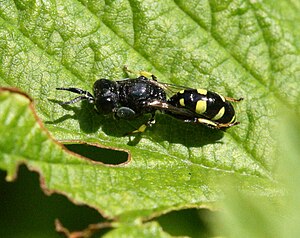Crabro peltarius
| Crabro peltarius | ||||||||||||
|---|---|---|---|---|---|---|---|---|---|---|---|---|

Crabro peltarius (male) |
||||||||||||
| Systematics | ||||||||||||
|
||||||||||||
| Scientific name | ||||||||||||
| Crabro peltarius | ||||||||||||
| ( Schreber , 1784) |
Crabro peltarius is a grave wasp from the family of Crabronidae .
features
The animals reach a body length of 9 to 13 millimeters. Their body is black and yellow in color, the scapus and the first tergite of the abdomen are spotted yellow. The mesonotum is smooth and shiny. The vertex is densely dotted. The females' third antennae is much longer than the fourth. The third to sixth antennae of the males are strongly widened and long hairy underneath. The forelegs are also widened and have a thorn at the base of the coxae and femora . The similar Crabro scutellatus is smaller and has a less strongly punctured vertex. Their first tergite is spotted black or yellow, the third antennae of the females is at most slightly longer than the fourth and the antennae of the males are only slightly widened and have short hairs.
Occurrence
The species occurs in Europe and Asia as far as Korea. It colonizes open sandy habitats, but it can also be found in settlement areas, for example in the sand joints of paving stones. The animals fly from late May to mid-September. The species is rare in Central Europe in the south and common in the north.
Way of life
The females of Crabro peltarius lay their nests up to 28 centimeters deep in the sand. The sand is pushed out of the hole with the hind legs and abdomen. Up to seven cells are created in the nest. Under good conditions, the females build their nests side by side and form aggregations. The males spend the night in the dead wood, with up to five individuals spending the night together. The brood is supplied with 9 to 16 flies of different species. These are hunted on trees and bushes. The species is parasitized by Myrmosa atrata .
swell
Web links
literature
- Rolf Witt: Wasps. Observe, determine. Naturbuch-Verlag, Augsburg 1998, ISBN 3-89440-243-1 .